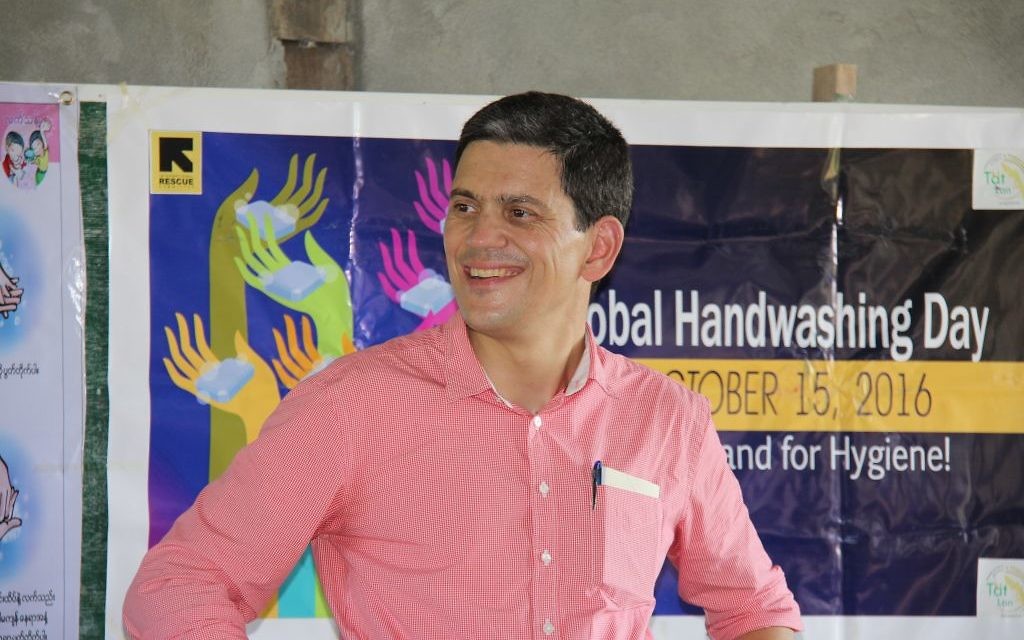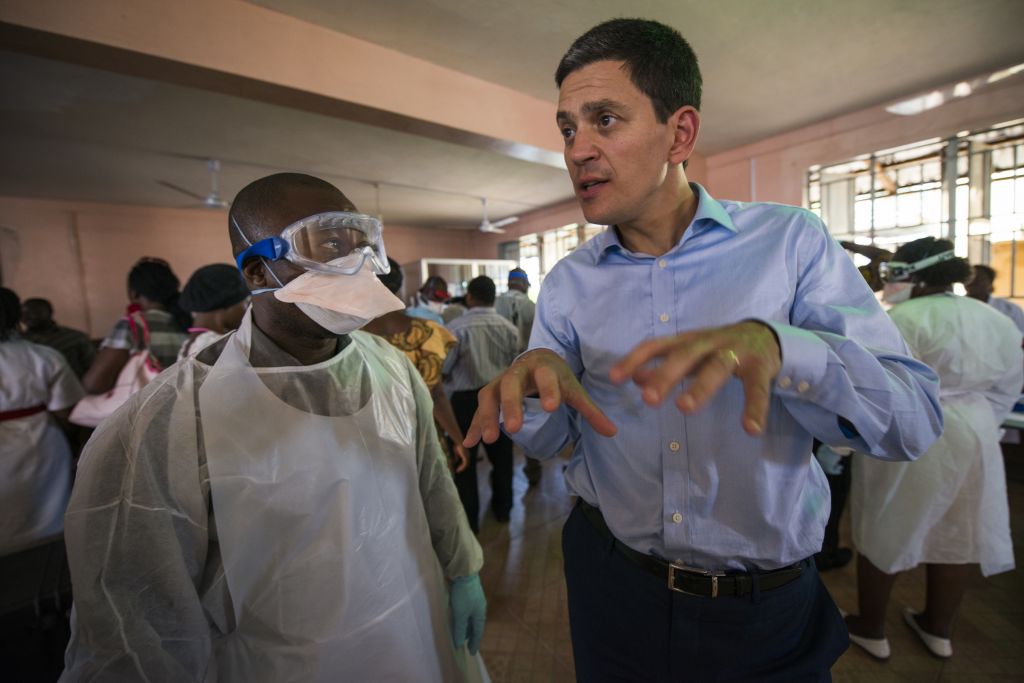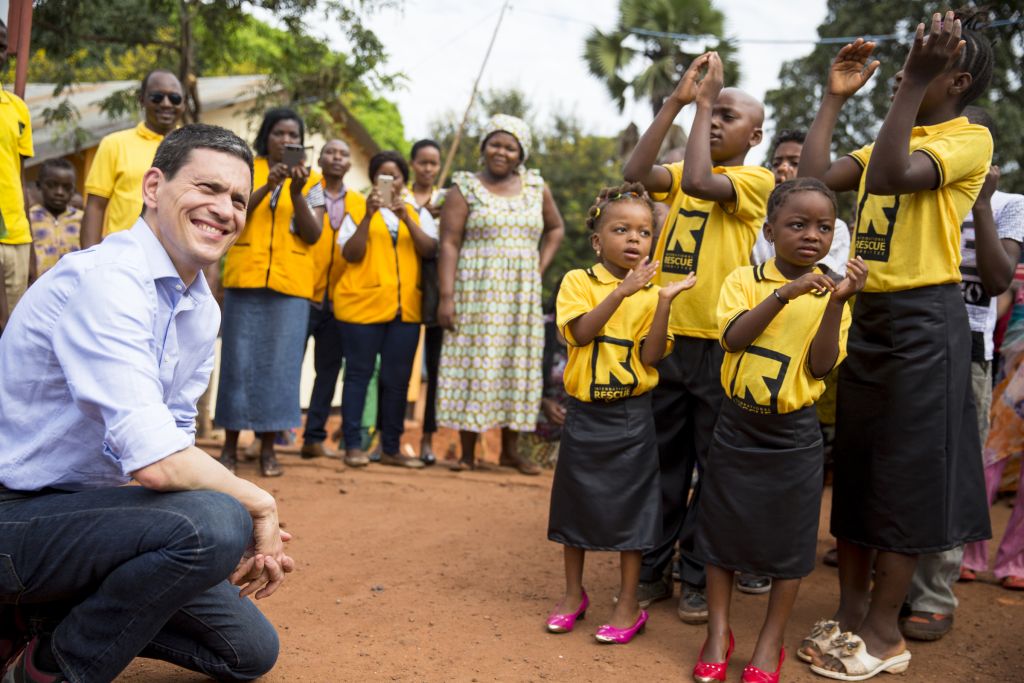David Miliband: ‘We are dealing with the symptoms of failed politics’
In an exclusive interview, the former foreign secretary discusses his three years on the front line of the global refugee crisis and refuses to rule out a return to UK politics before 2020

Since David Miliband moved to New York, barely a month gone by without speculation over his next move.
From the stories about former parliamentary colleagues urging him to return to Westminster in the Batley and Spen by-election and his withering criticism of “unelectable” Jeremy Corbyn during the Labour leadership contest, to suggestions he could be in line for a job in Hillary Clinton’s top team if she had won the White House, there’s been no end of speculation.
But while he refuses to rule out a return before 2020, the former foreign secretary, who could realistically have been in Downing Street now had he not lost the 2010 Labour contest, has spent the past three years on the front line of a global emergency, the significance of which has occupied governments worldwide.
Get The Jewish News Daily Edition by email and never miss our top stories Free Sign Up
In a year that saw 65 million people displaced through conflict, the International Rescue Committee (IRC) he heads has helped provide 23 million in desperate need with access vital education, training and healthcare services across four continents.
In an exclusive interview with Jewish News ahead of an appearance tonight, at JW3 as part of the Alan Howard Foundation series Miliband, whose parents both fled the Nazis, said the “global system is failing in a fundamental way.
“Sixty-five million people displaced by conflict in 2015 is a record. The length of displacement is growing so less than one percent on refugees went home last year. And the conditions I see – I was in Myanmar last month – are really appalling. There’s a growing mismatch between the scale of the need and the adequacy of provision. That is happening at a time when there’s been a rise in some toxic politics when it comes to the treatment of refugees, who are victims of terror and not terrorists and are sometimes treated in a dehumanised way.”
It was a mixture of the personal – being able to help people “the same way other people helped my parents nearly 80 years ago” – and the worsening crisis on the ground that led to him to apply to the New York-based charity.
“The intersection of humanitarian aid and foreign policy are some of the most challenging and interesting and important questions in global public policy,” he said.
And he is under no illusion that this is a crisis that willed be talked about in the past tense while he is in the job and insisted the world should be planning on the assumption numbers of refugee numbers will continue to rise. “There are still 17 million people inside Syria and there’s no sign of the war coming to an end. The long-term conflict in Afghanistan, Somalia and Congo roll on.”
He suggested Britain’s contribution amid the refugee crisis was “half good and half not so good” – with the department for international development one of the highest financial contributors to aid “in terms of the scale of the British aid budget and the quality of the spend”.
But he added: “When it comes to welcoming or admitting refugees then the British numbers are very low. Even in respect of unaccompanied children there’s been quite a high degree of inertia. The commitment from the Cameron and now the May governments equates to six refugees per parliamentary constituency – and no one can persuade me that is going to overwhelm a constituency.”
On the day the government agreed to publish a new strategy on unaccompanied minors following pressure from former Kindertransport refugee Lord Dubs, Miliband said IRC’s calculations suggested an intake of 20,000 would be an appropriate British share of the global responsibility. “Remember,” he pointed out, “The vast bulk of refugees – 85 percent plus – are in poorer countries. The main refugee hosting countries are in poorer countries are Lebanon, Jordan, Kenya, Ethiopia, Pakistan. The rich parts of the world take a very small fraction.”

(Credit IRC/Peter Biro)
The IRC helped settle nearly 10,000 refugees in the US last year. But reflecting on a election campaign that saw Donald Trump insist America shouldn’t take refugees from Syria, he also emphasised the country’s long history of “patriotic and productive” refugees including IRC founder Albert Einstein and the current “comprehensive vetting process” in place.
However, he has high praise for the response to the crisis the Jewish community – that has seen record funds raised through an appeal by World Jewish Relief and practical support from synagogues – and particularly for the Chief Rabbi whose visit to a refugee camp in Greece he described as “significant”.
“All communities have a responsibility to defend ideals of humanity and fellowship when they’re under strain. The work of Rescue is obviously what we do for people far away whose names we may never know but our work is also to defend ideals of social justice and humanity that are all too tragically under assault including in Europe. The rise of race attacks, the rise in anti-Semitic attacks, the rise of far right parties shows the work of Rescue is about defending our own value base as well as providing material rescue to people far away.”

(Credit: IRC/Griff Tapper)
Saying he is particularly proud during his time in job to have established “real scale and presence in the Syrian region” and to have defied legal cases in the US to continue settling refugees there, he said: “We feel a special responsibility to develop the most appropriate operational interventions for displaced people in health, education, employment, child protection, women’s protection.
“But I would never claim I’m going to solve the world’s problems in this job partly because the long-terms trends that are driving the current levels of displacement. We are dealing with the symptoms of failed politics and there’s plenty of that around.”
Asked if he would consider a move back to the UK before the next election, he said: “I feel the job I’m doing at the moment is taking my energy and I’m learning, I’m having an impact, that’s the test for me. That’s what I keep under review.”
I press one last time, asking if anything had tempted him to return so far. “I care a lot about Britain and I think the Labour Party has an historic role and responsibility in taking Britain forward. One’s got to lead one’s life in a way that doesn’t have potential question marks over one’s head so I’m getting on with my job.”

Thank you for helping to make Jewish News the leading source of news and opinion for the UK Jewish community. Today we're asking for your invaluable help to continue putting our community first in everything we do.
For as little as £5 a month you can help sustain the vital work we do in celebrating and standing up for Jewish life in Britain.
Jewish News holds our community together and keeps us connected. Like a synagogue, it’s where people turn to feel part of something bigger. It also proudly shows the rest of Britain the vibrancy and rich culture of modern Jewish life.
You can make a quick and easy one-off or monthly contribution of £5, £10, £20 or any other sum you’re comfortable with.
100% of your donation will help us continue celebrating our community, in all its dynamic diversity...
Engaging
Being a community platform means so much more than producing a newspaper and website. One of our proudest roles is media partnering with our invaluable charities to amplify the outstanding work they do to help us all.
Celebrating
There’s no shortage of oys in the world but Jewish News takes every opportunity to celebrate the joys too, through projects like Night of Heroes, 40 Under 40 and other compelling countdowns that make the community kvell with pride.
Pioneering
In the first collaboration between media outlets from different faiths, Jewish News worked with British Muslim TV and Church Times to produce a list of young activists leading the way on interfaith understanding.
Campaigning
Royal Mail issued a stamp honouring Holocaust hero Sir Nicholas Winton after a Jewish News campaign attracted more than 100,000 backers. Jewish Newsalso produces special editions of the paper highlighting pressing issues including mental health and Holocaust remembrance.
Easy access
In an age when news is readily accessible, Jewish News provides high-quality content free online and offline, removing any financial barriers to connecting people.
Voice of our community to wider society
The Jewish News team regularly appears on TV, radio and on the pages of the national press to comment on stories about the Jewish community. Easy access to the paper on the streets of London also means Jewish News provides an invaluable window into the community for the country at large.
We hope you agree all this is worth preserving.
- Features
- News
- david miliband
- Afghanistan
- Somalia
- Congo
- New York
- international rescue committee
- irc
- Myanmar
- Nazis
- Batley and Spen
- Jeremy Corbyn
- humanitarian aid
- Syria
- Lebanon
- Jordan
- Kenya
- Ethiopia
- pakistan
- r Albert Einstein
- Jewish community
- anti-Semitic attacks
- refugee crisis
- Labour Antisemitism
- The Labour Party
-
By Brigit Grant
-
By Laurent Vaughan - Senior Associate (Bishop & Sewell Solicitors)
-
By Laurent Vaughan - Senior Associate (Bishop & Sewell Solicitors)
-
By Laurent Vaughan - Senior Associate (Bishop & Sewell Solicitors)
-
By Laurent Vaughan - Senior Associate (Bishop & Sewell Solicitors)





















